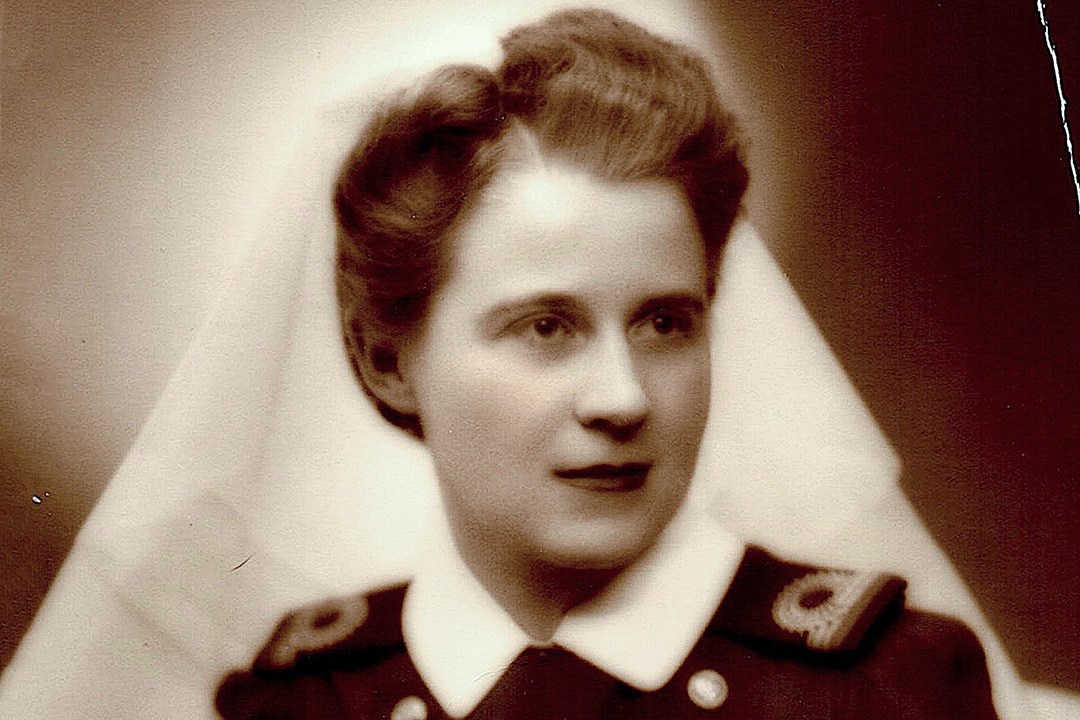
HMCS Margaret Brooke: Honouring heroism
Seventy-seven years ago, in the icy waters of the North Atlantic, Dr. Margaret Brooke (PhD) survived a terrifying torpedo attack by a German submarine in the middle of the night.
By James ShewagaHer act of heroism in trying to save the life of a fellow Royal Canadian Navy nurse on that frigid October night during the Second World War earned the University of Saskatchewan (USask) alumna the distinction of becoming the first woman to have a Canadian navy ship named after her.
The HMCS Margaret Brooke—currently under final construction in the shipyards in Halifax—is expected to be launched in the next few months, honouring the courage and legacy of a woman who inspired future generations to serve their country, including Commander Michelle Tessier, who will be the first commanding officer of the new offshore patrol vessel bearing Brooke’s name.
“The more I learn about LCdr./Dr. Brooke, the more I realize how strong and resilient a person she was,” said Cdr. Tessier. “She showed determination, strength and courage in all she did, whether it was her education, her work, or in the face of unthinkable danger. I have had the honour of meeting two of her nieces, Margaret (who is the ship’s sponsor) and Allison, who clearly view their aunt as a role model. So, in everything I do representing the ship that will bear her name, I aim to do it in a way that honours her memory and makes her family proud.”
Prior to her passing, Brooke learned in 2015 that a new ship would be named in her honour for her actions on the night of Oct. 14, 1942. Brooke was travelling aboard the ferry SS Caribou, which was attacked and struck by a German torpedo off the coast of Newfoundland at 3:14 am, and quickly sank 1,500 feet to the murky depths of the Atlantic just five minutes later.
Only 101 of the 237 passengers aboard survived, including Brooke, who desperately clung to a fellow navy nurse sister Agnes Wilkie for hours with one arm while hanging on to an overturned lifeboat with the other. Hypothermia soon rendered Wilkie unconscious, but Brooke held on to her in the choppy seas until daybreak before a large wave crashed into the lifeboat and swept her friend away.
In 1943, Brooke was named a Member of the Order of the British Empire for her “gallantry and courage whilst in the water in attempting to save the life of another nursing sister.” Brooke, who was born in 1915 in Ardath, Sask., would continue to serve 20 years in the navy, rising to the rank of Lieutenant-Commander before returning to Saskatoon to continue her education at USask.
Brooke, who earned a health science degree prior to the war, came back to campus to earn a bachelor’s and then PhD in paleontology and served as an instructor and researcher in USask’s Department of Geological Sciences until retiring in 1986. During her time on campus, Brooke co-authored a number of influential geological papers, and yet rarely spoke about her service during the war.
“Her PhD supervisor once told me that in all the time working together at the University of Saskatchewan, he never knew what had happened to her during the war, let alone being a decorated veteran,” said Tessier.
“The fact that she was made a Member of the Order of the British Empire—an honour only 2,700 Canadians have ever received—speaks volumes. I am nowhere near the trailblazer or role model she was, but I am proud to have a platform to encourage people to embrace their passions and do what they love, because they live in a country that lets them do that. If it weren’t for women like LCdr. Brooke, I wouldn’t be where I am today.”
Brooke, who was named an Alumni of Influence by the College of Arts and Science in 2018, passed away on Jan. 9, 2016 at the age of 100.
Article re-posted on .
View original article.

